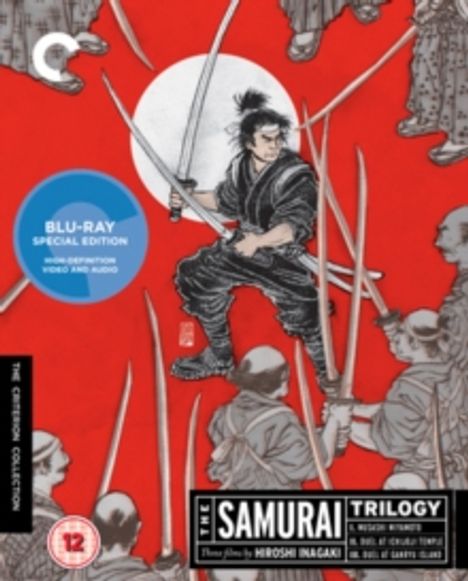The Samurai Trilogy (1954-1956) (Blu-ray) (UK Import)
The Samurai Trilogy (1954-1956) (Blu-ray) (UK Import)
Die Blu-Ray wurde als High-Definition-Nachfolger der DVD entwickelt und bietet ihrem Vorläufer gegenüber eine erheblich gesteigerte Datenrate und Speicherkapazität. Auf Blu-Rays können daher Filme mit deutlich besserer Auflösung gespeichert werden und bieten auf entsprechenden Bildschirmen eine enorm hohe Bildqualität. Blu-Ray-Player sind in der Regel abwärtskompatibel zu DVDs, so dass auch diese abgespielt werden können.
Lassen Sie sich über unseren eCourier benachrichtigen, falls das Produkt bestellt werden kann.
- Herkunftsland:
- Japan, 1954-1956
- Altersfreigabe:
- Dieser Titel ist nicht FSK-geprüft.
Eine Lieferung an Minderjährige ist nicht möglich.
Infos zu Titeln ohne Jugendfreigabe - UPC/EAN:
- 5050629049121
- Erscheinungstermin:
- 5.9.2016
- Serie:
- Criterion Collection
- Genre:
- Spieldauer ca.:
- 300 Min.
- Regie:
- Hiroshi Inagaki
- Sprache:
- Japanisch
- Untertitel:
- Englisch
Ähnliche Artikel
The Samurai Trilogy, directed by Hiroshi Inagaki and starring the inimitable Toshiro Mifune, was one of Japan’s most successful exports of the 1950s, a rousing, emotionally gripping tale of combat and self-discovery. Based on a novel that’s often called Japan’s Gone with the Wind, this sweeping saga fictionalizes the life of the legendary seventeenth-century swordsman (and writer and artist) Musashi Miyamoto, following him on his path from unruly youth to enlightened warrior. With these three films—1954’s Oscar-winning Musashi Miyamoto, 1955’s Duel at Ichijoji Temple, and 1956’s Duel at Ganryu Island—Inagaki created a passionate epic that’s equal parts tender love story and bloody action.
In 'Samurai I: Musashi Miyamoto' (1954), orphan Musashi Miyamoto (Toshirô Mifune) leaves his home village to join the army with his best friend Honiden Matahachi (Rentarô Mikuni) who is betrothed to local girl Otsu (Kaoru Yachigusa).
While they are away, Matahachi is seduced by another woman, and when Miyamoto returns to the village alone to break the news, Matahachi's family accuse him of telling lies and sentence him to death.
He is rescued by a Buddhist monk and educated in the ways of the Samurai, but as he becomes proficient in his art, Miyamoto is forced to choose between the way of the warrior and the possibility of happiness with Otsu, who has now fallen in love with him...
In 'Samurai II: Duel at Ichijoji Temple' (1955), after years on the road perfecting his sword fighting skills, Miyamoto returns to his home village to find his former love Otsu still waiting for him patiently. However, the Samurai warrior is disinterested in love and only interested in defending his reputation by taking on students from the local fencing school.
In 'Samurai III: Duel at Ganru Island' (1956), Miyamoto renounces his quest for fame in favour of the search for inner truth, but after settling down in a quiet peasant village, he is forced to take up arms when his sanctuary is attacked by marauding bandits.
New high-definition digital restorations of all three films, with uncompressed monaural soundtracks on the Blu-ray editions
New interviews with translator and historian William Scott Wilson about the real-life Musashi Miyamoto, the inspiration for the hero of the films
Trailers
New English subtitle translations
PLUS: A booklet featuring new essays by film historian Stephen Prince and Wilson
New cover by Yuko Shimizu






